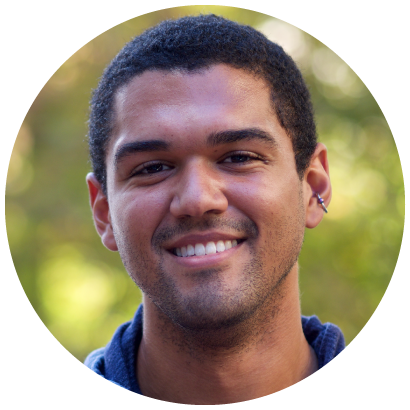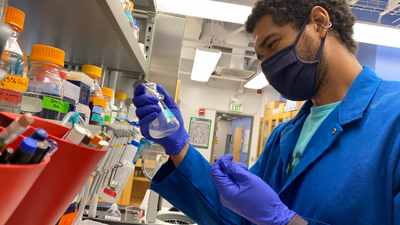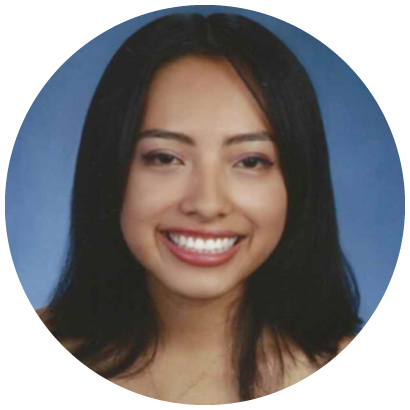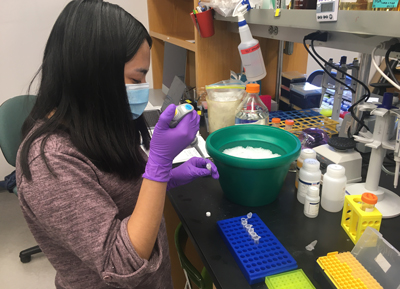 Times flies—the NSF REU summer research program is more than halfway through! This week we're introducing summer researchers in the Ünal lab. The program provides learning and growth opportunities for both scholars and mentors. Discover how a scholar is developing her research skills and increasing her knowledge base in preparation for a future research career. Learn how a mentor has reflected on and shared his academic journey.
Times flies—the NSF REU summer research program is more than halfway through! This week we're introducing summer researchers in the Ünal lab. The program provides learning and growth opportunities for both scholars and mentors. Discover how a scholar is developing her research skills and increasing her knowledge base in preparation for a future research career. Learn how a mentor has reflected on and shared his academic journey.
Meet Lizet Reyes Rodas and Anthony Harris.
LIZET REYES RODAS
|
|||
|
|
What is your research project this summer?
I am working on a project that aims to understand the regulatory mechanisms for meiotic differentiation. My mentor, Anthony, is specifically looking at a protein called Ume6. It is known that Ume6 acts as a repressor in mitosis. Meanwhile, in meiosis, Ume6 activates early meiotic genes such as Ndt80 for meiotic division and ultimately this causes Ume6 to degrade. We are trying to figure out what intermediate factors does Ndt80 activates that cause Ume6 to degrade. First, we are testing whether the intermediate unknown factor is active in mitosis by checking if Ume6 degrades? For this, Ndt80 is being induced in yeast cells and protein analysis is being conducted using western blots. If Ume6 fails to degrade in mitosis, it will show us that this unknown factor is more meiosis-specific. Secondly, we want to identify regions in Ume6 that are recognized by this unknown factor for degradation in meiosis. Ume6 will be truncated and induced in cells, and Ndt80 will be activated to see whether Ume6 degradation is prevented. If the region of the Ume6 is found responsible for degradation, we will test if other proteins are degraded as well by this unknown factor. Overall, our goal is to understand the mechanism behind the activation of Ndt80 that causes Ume6 to degrade.
What are you looking forward to doing/exploring in Berkeley/the Bay Area this summer and why?
I am looking forward to exploring the various trails around Berkeley and trying out all the different restaurants!
 |
ANTHONY HARRIS
REU MENTOR
Graduate Student | Ünal Lab
What motivated you to participate in the REU program?
It’s a great opportunity to meet young researchers excited about science and give them an opportunity to pioneer their own project in a laboratory.
What are some of the highlights of your experience mentoring REU students so far?
My mentee has been a delight to work with and has done a great job striking a good balance between taking the project seriously and having a good time.
 Harris getting ready to check the sporulation efficiency in preparation for a big experiment. Photo courtesy Anthony Harris. |
What have you learned from working with REU students (personally or professionally)?
Graduate school has been a challenging yet rewarding experience where I’ve had to learn a great deal of information over a short period of time. Within that experience, sometimes it’s easy to focus on how much I’ve yet to learn. Having an REU student has given me an opportunity to instead focus on the knowledge that I’ve gained. This has allowed me to appreciate how far I’ve come and how much I have to offer young researchers to get them started on their own projects.
What was the most impactful mentoring experience you had and how has it influenced your own mentoring style?
This has been my first time mentoring in a one-on-one environment. So my “mentoring style” is still developing.
MORE INFORMATION:
Learn more about the NSF REU @Berkeley program: mcb.berkeley.edu/nsfreu/
Read MCB's Fall 2018 newsletter article about the program: mcb.berkeley.edu/news-and-events/transcript/fall-2018-nsf-reu-program
Visit the Ünal lab website to learn more about her research program:
- Ünal lab: unal-and-brar-labs.org
Banner image: Nuclear pore complexes are excluded during meiosis. DNA is blue, nuclear pore complexes are red, and cell membranes are green. Nuclear pore complex removal, which occurs as part of meiosis is implicated in the removal of age-induced damage. Photo courtesy Grant King, Ünal lab. Acquired on a Deltavision Elite fluorescence microscope.

